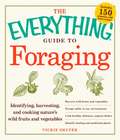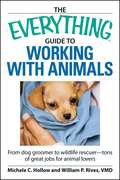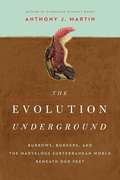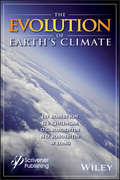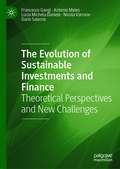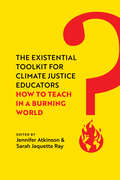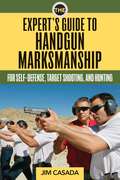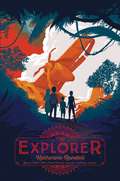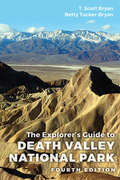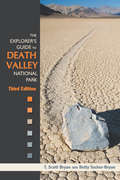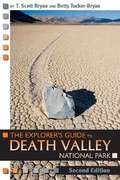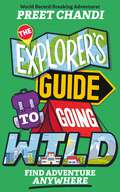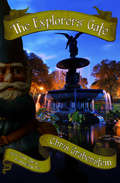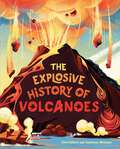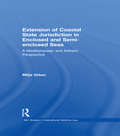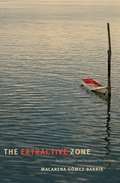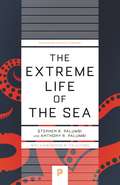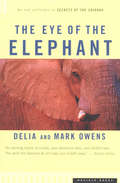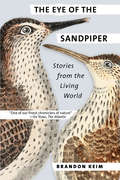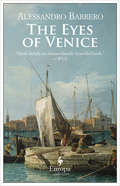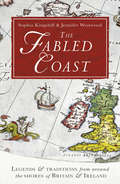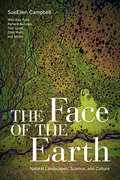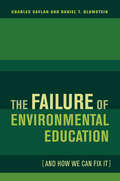- Table View
- List View
The Everything Guide to Foraging: Identifying, Harvesting, and Cooking Nature's Wild Fruits and Vegetables
by Vickie ShuferIf you're searching for the freshest fruits and vegetables to add to your diet, you don't have to look any further than your own backyard! With dozens of detailed illustrations, color photos, and more than 150 tasty recipes, this guide is your ultimate one-stop reference for identifying and harvesting the wild fruits and vegetables that grow in fields, forests, and even on your own lawn.Inside you'll find:In-depth descriptions of edible plants, including their likely locationsEasy and delicious recipes for your wild harvestA primer on careful foraging techniques and conservation ethicsEssential information on poisonous look-alikes From clover and cattails to milkweed and mustard, this book will teach you how to collect and prepare some of the most common--and delicious--feral plants in America. And, more than just a way to a fantastic meal, this book will guide you to both a newfound confidence in your own abilities, as well as a greater appreciation of the natural world.
The Everything® Guide To Working With Animals
by Michele C. Hollow William P. Rives VmdAnimal acupuncturist. Zoo designer. Wildlife rehabilitator. Working with animals can involve much more than helping at an animal shelter or grooming dogs. There are lots of different jobs out there for people who share a deep concern for the welfare of animals. Authors Michele C. Hollow and Dr. William P. Rives give you the inside scoop on all of them, including: Veterinarian and veterinary technician Zoo worker Animal trainer for movies and TV Beekeeper Guide dog trainer This unique career guide features personal stories from experts in the field, including a large-animal surgeon, a professional dog trainer, an animal behaviorist, and the former president and CEO of the American Society for the Prevention of Cruelty to Animals. This guide gives you everything you need to find a job that fits your animal-loving personality.
The Evolution Underground: Burrows, Bunkers, and the Marvelous Subterranean World Beneath our Feet
by Anthony J. MartinWhat is the best way to survive when the going gets tough? Hiding underground. From penguins to dinosaurs, trilobites, and humans, Anthony Martin reveals the subterranean secret of survival. Humans have “gone underground” for survival for thousands of years, from underground cities in Turkey to Cold War–era bunkers. But our burrowing roots go back to the very beginnings of animal life on earth. Without burrowing, the planet would be very different today. Many animal lineages alive now—including our own—only survived a cataclysmic meteorite strike 65 million years ago because they went underground. On a grander scale, the chemistry of the planet itself had already been transformed many millions of years earlier by the first animal burrows, which altered whole ecosystems. Every day we walk on an earth filled with an under-ground wilderness teeming with life. Most of this life stays hidden, yet these animals and their subterranean homes are ubiquitous, ranging from the deep sea to mountains, from the equator to the poles. Burrows are a refuge from predators, a safe home for raising young, or a tool to ambush prey. Burrows also protect animals against all types of natural disasters: fires, droughts, storms, meteorites, global warmings—and coolings. In a book filled with spectacularly diverse fauna, acclaimed paleontologist and ichnologist Anthony Martin reveals this fascinating, hidden world that will continue to influence and transform life on this planet.
The Evolution of Earth's Climate: A Scienctific Basis
by J. O. Robertson G. V. Chilingar O. G. Sorokhtin N. O. Sorokhtin W. LongClimate change is one of the most controversial and argued issues in the world today, and it has been for years. It has been politicized by politicians on all sides, some scientists have used the study of it for their own material gain above true scientific discovery, and some scientific theories surrounding it have been believed even though proven false. But there is not, by any means, complete agreement among all scientists throughout the world on this issue. Written by two of the world’s most well-respected environmental and petroleum engineers, this book is meant to be one voice in the scientific literature on this important subject. Other books, also available from Wiley-Scrivener, take the opposite stance, but it is important, in our scientific journey, to listen to all voices and rely on facts, rather than opinions. We trust the reader to make his or her decisions based on all of the facts, and not just some of them.
The Evolution of Sustainable Investments and Finance: Theoretical Perspectives and New Challenges
by Lucia Michela Daniele Francesco Gangi Antonio Meles Nicola Varrone Dario SalernoOver the last decade, socially responsible investments (SRIs) have become paramount to both professionals and academics. In the aftermath of the financial crisis of 2007-8, practitioners have become much more involved in new financial models that integrate returns and positive social and environmental impacts. The authors argue that previous irresponsible financial models are anachronistic, and propose a new relationship between stakeholder and shareholder. Starting from the mainstreaming of SRI, this book recovers the social function of banks and the innovative role of crowdfunding and venture capital models. The book offers a unified perspective for firm and funder, making it a timely and invaluable read for scholars and practitioners interested in sustainable development and social impact finance.
The Existential Toolkit for Climate Justice Educators: How to Teach in a Burning World
by Sarah Jaquette Ray Jennifer AtkinsonAn easy-to-use field guide for teaching on climate injustice and building resilience in your students—and yourself—in an age of crisis. As feelings of eco-grief and climate anxiety grow, educators are grappling with how to help students learn about the violent systems causing climate change while simultaneously navigating the emotions this knowledge elicits. This book provides resources for developing emotional and existential tenacity in college classrooms so that students can stay engaged. Featuring insights from scholars, educators, activists, artists, game designers, and others who are integrating emotional wisdom into climate justice education, this user-friendly guide offers a robust menu of interdisciplinary, plug-and-play teaching strategies, lesson plans, and activities to support student transformation and build resilience. The book also includes reflections from students who have taken classes that incorporate their emotions in the curricula. Galvanizing and practical, The Existential Toolkit for Climate Justice Educators will equip both educators and their students with tools for advancing climate justice.
The Expert's Guide to Handgun Marksmanship: For Self-Defense, Target Shooting, and Hunting
by Jim CasadaFor self-defense with a handgun, target shooting, or hunting, this new book is a must read! The expertise of the world’s leading handgun experts-Charles Askins, Jr., Jeff Cooper, Julian S. Hatcher, Jack O’Connor, William Reichenbach, plus excerpts from US Army Field Manuals-is brought together for the first time in this convenient pocket-sized edition-everything you need to know to improve upon your handgun marksmanship skills.This informative, 160-page, fact-filled book is guaranteed to improve your handgun accuracy.Skyhorse Publishing is proud to publish a broad range of books for hunters and firearms enthusiasts. We publish books about shotguns, rifles, handguns, target shooting, gun collecting, self-defense, archery, ammunition, knives, gunsmithing, gun repair, and wilderness survival. We publish books on deer hunting, big game hunting, small game hunting, wing shooting, turkey hunting, deer stands, duck blinds, bowhunting, wing shooting, hunting dogs, and more. While not every title we publish becomes a New York Times bestseller or a national bestseller, we are committed to publishing books on subjects that are sometimes overlooked by other publishers and to authors whose work might not otherwise find a home.
The Explorer
by Katherine RundellFrom Boston Globe–Horn Book Award winner Katherine Rundell comes an exciting new novel about a group of kids who must survive in the Amazon after their plane crashes.Fred, Con, Lila, and Max are on their way back to England from Manaus when the plane they&’re on crashes and the pilot dies upon landing. For days they survive alone, until Fred finds a map that leads them to a ruined city, and to a secret.
The Explorer's Guide to Death Valley National Park, Fourth Edition
by T. Scott Bryan Betty Tucker BryanOriginally published in 1995, soon after Death Valley National Park became the fifty-third park in the US park system, The Explorer’s Guide to Death Valley National Park was the first complete guidebook available for this spectacular area. Now in its fourth edition, this is still the only book that includes all aspects of the park. Much more than just a guidebook, it covers the park’s cultural history, botany and zoology, hiking and biking opportunities, and more. Information is provided for all of Death Valley’s visitors, from first-time travelers just learning about the area to those who are returning for in-depth explorations. This new edition features a number of important changes—including information on the boundary and wilderness changes that resulted from the Dingell Act of 2019, the reopened Keane Wonder Mine area, the devastating flash flooding of Scotty’s Castle, scenic river designations, the Inn and Ranch resorts, renovated and now operated as the Oasis at Death Valley—as well as new maps and updated color photos. With extensive input from National Park Service resource management, law enforcement, and interpretive personnel, as well as a thorough bibliography for suggested reading, The Explorer’s Guide to Death Valley National Park, Fourth Edition is the most up-to-date, accurate, and comprehensive guide available for this national treasure.
The Explorer's Guide to Death Valley National Park, Third Edition
by T. Scott Bryan Betty Tucker-BryanOriginally published in 1995, soon after Death Valley National Park became the fifty-third park in the US park system, The Explorer's Guide to Death Valley National Park was the first complete guidebook available for this spectacular area. Now in its third edition, this is still the only book that includes all aspects of the park. Much more than just a guidebook, it covers the park's cultural history, botany and zoology, hiking and biking opportunities, and more. Information is provided for all of Death Valley's visitors, from first-time travelers just learning about the area to those who are returning for in-depth explorations. The book includes updated point-to-point logs for every road within and around the park, as well as more accurate maps than those in any other publication. With extensive input from National Park Service resource management, law enforcement, and interpretive personnel, as well as a thorough bibliography for suggested reading, The Explorer's Guide to Death Valley National Park, Third Edition is the most up-to-date, accurate, and comprehensive guide available for this national treasure.
The Explorer's Guide to Death Valley, Second Edition
by T. Scott Bryan Betty Tucker-BryanOriginally published in 1995, soon after Death Valley National Park became the fifty-third park in the U.S. park system, The Explorer's Guide to Death Valley National Park was the first complete guidebook available for this spectacular area. Now in its second edition, this is still the only book that includes all aspects of the park. Much more than just a guidebook, it covers the park's cultural history, botany and zoology, hiking and biking opportunities, and more. Information is provided for all of Death Valley's visitors, from first-time travelers just learning about the area to those who are returning for in-depth explorations. Rewritten, reorganized, and revised, the book includes updated point-to-point logs for every road within and around the park, as well as new maps more accurate than those in any other publication. With extensive input from National Park Service resource management, law enforcement, and interpretive personnel, as well as a thorough bibliography for suggested reading, The Explorer's Guide to Death Valley National Park, Second Edition is the most up-to-date, accurate, and comprehensive guide available for this national treasure.
The Explorer's Guide to Going Wild: Find Adventure Anywhere
by Preet ChandiADVENTURE CAN BE FOUND JUST OUTSIDE THE DOOR A must-have book for kids who love to explore. Written by EXPLORER OF THE YEAR 2023, MBE Preet Chandi. Do you know a child who loves to explore but isn't sure how to plan their own adventures? Are they often preoccupied by an iPad when they could be outdoors? Then this is the perfect book for them! In this book, kids will learn how they can become a master explorer. Whether they want to learn how to camp in the wild, navigate their way through a new landscape, master bushcraft skills or plan a polar expedition, this book will show them how to do it.Each chapter has a mini challenge for young explorers to try at home, from learning how to read the stars to building a den. All these skills will help children to push their boundaries, build a resilient explorer mindset and get outdoors. And with fun black and white illustrations, having an adventure couldn't be easier! Written by world record-breaking adventurer 'Polar' Preet, who has been on adventures all around the world: from navigating 40 days on the Antarctic ice and a 700-mile journey to the South Pole to racing through the deserts of South Sudan. Preet shares tales of her own expeditions, big and small, as well as practical things kids can do, to inspire her readers to try new things and have their own adventures (even on their doorsteps!).Children will want to grab a copy, step outside and start creating their own adventure stories.
The Explorers' Gate
by Chris GrabensteinIn New York City's Central Park, remarkable things happen after the sun goes downNikki Van Wyck knows everything about Central Park. She can tell you how many benches it has, how many acres it is--and exactly where to find an adventure after dark. When she teams up with a few new friends to track down a treasure in the park, her expert knowledge comes in handy. But the place she thought she knew is transformed before her eyes as the statues begin to come to life!It turns out that Central Park has secrets that can't be found in any guidebook. Magical secrets. And what Nikki thought was just a scavenger hunt is actually much more. Now she's about to embark on an incredible adventure that will uncover the hidden enchantments in the park she loves--and reveal surprising things about herself, as well.
The Explosive History of Volcanoes
by Clive GiffordSpewing out fountains of red-hot lava and toxic plumes of smoke, volcanoes are dangerous and deadly. But every volcano is different - in shape and size, location and destructiveness.The Explosive History of Volcanoes explains the Volcanic Explosivity Index giving examples of more than 25 of the most, and least, explosive volcanoes in history and in the world today.Find out about these amazing natural phenomena and see how they're formed, where they are in the world and why some explode so violently. Discover why people live so close to volcanoes and how scientists are helping to predict when the next eruptions might occur.The consultant, Professor Katharine Cashman, is Professor of Volcanology, currently working at the University of Oregon.
The Exquisite Book of Paper Flower Transformations: Playing with Size, Shape, and Color to Create Spectacular Paper Arrangements
by Livia Cetti&“Equips crafters with the skills for creating individual flowers and larger arrangements while providing a delightful overview on the basics of botany.&” —Publishers Weekly In The Exquisite Book of Paper Flower Transformations, artist Livia Cetti ups the ante with a host of grander and more intricate flowers and projects—more blooms, more petals, stronger stems, and bigger, bolder arrangements! Cetti will teach you how to play with size, shape, color, and texture to create twenty-five vibrant single stems in a variety of natural shapes—globes, spikes, bells, saucers, rectangles, cones, and arcs—including hydrangeas, coral charm peonies, honeysuckles, and paperwhites. Then, you&’ll use these elemental shapes to build the 15 bright, abundant arrangements, including bold wreaths, bountiful bouquets, fantastical gilded wall art, and blooming garlands. Introducing new, never-before-seen techniques for dyeing paper and creating moldable leaves and petals, this gorgeous guide is perfect for crafters of all skill levels interested in making realistic and unique home decor, gifts, accessories, and entertaining essentials. &“Unlike fresh-cut flowers, paper blooms last forever. And if you make them like floral stylist, crafter and creative director Livia Cetti, they might even be mistaken for the real thing. One of the top paper-flower artists in the U.S.&” —House & Home
The Extension of Coastal State Jurisdiction in Enclosed or Semi-Enclosed Seas: A Mediterranean and Adriatic Perspective (IMLI Studies in International Maritime Law #4)
by Mitja GrbecThe current jurisdictional status of the Mediterranean Sea is remarkable. Nearly 50 per cent of the Mediterranean waters are high seas and therefore beyond the jurisdiction of coastal States. This situation means that there are no points in the Mediterranean Sea where the coasts of two States would be more than 400 nautical miles apart. Such a legal situation generally prevents coastal States from adopting and enforcing their laws on the Mediterranean high seas, in respect of many important fields such as the protection and preservation of the marine environment, as well as the conservation of marine living resources. The jurisdictional landscape of the Adriatic Sea as a sub-sea and sub-region of the Mediterranean, is even more interesting. Croatia has proclaimed an Ecological and Fisheries Protection Zone, Slovenia has proclaimed a Zone of Ecological Protection, while Italy has adopted a framework law for the proclamation of its Zone of Ecological Protection without proclaiming its regime in the Adriatic. It is noteworthy that if all Mediterranean and Adriatic States would proclaim an Exclusive Economic Zone (EEZ), there would not be a single stretch of high seas left in the entire Mediterranean Sea. Both the Adriatic and Mediterranean fall in the category of enclosed or semi-enclosed seas regulated by Part IX of the United Nations Convention on the Law of the Sea (UNCLOS). This book assesses the legal nature of Part IX of UNCLOS and discusses potential benefits of the extension of coastal State jurisdiction (proclamation of EEZs and/or similar sui generis zones), particularly in light of the recent calls towards an integrated and holistic approach to the management of different activities in the Mediterranean Sea. It examines the actual or potential extension of coastal State jurisdiction in the Adriatic Sea, against the background of similar extensions elsewhere in the Mediterranean and against the background of relevant EU policies. It additionally explores whether Part IX of UNCLOS imposes any duties of cooperation in relation to the extension of coastal State jurisdiction in enclosed or semi-enclosed seas, and puts forward practical suggestions as to how the issue of extension of coastal State jurisdiction could be approached in a way which would enhance States existing cooperation and improve the overall governance in the Mediterranean and Adriatic seas. This book will be of interest to policymakers and academics and students of international law, and the law of the sea.
The Extractive Zone: Social Ecologies and Decolonial Perspectives
by Macarena Gómez-BarrisIn The Extractive Zone Macarena Gómez-Barris traces the political, aesthetic, and performative practices that emerge in opposition to the ruinous effects of extractive capital. The work of Indigenous activists, intellectuals, and artists in spaces Gómez-Barris labels extractive zones—majority indigenous regions in South America noted for their biodiversity and long history of exploitative natural resource extraction—resist and refuse the terms of racial capital and the continued legacies of colonialism. Extending decolonial theory with race, sexuality, and critical Indigenous studies, Gómez-Barris develops new vocabularies for alternative forms of social and political life. She shows how from Colombia to southern Chile artists like filmmaker Huichaqueo Perez and visual artist Carolina Caycedo formulate decolonial aesthetics. She also examines the decolonizing politics of a Bolivian anarcho-feminist collective and a coalition in eastern Ecuador that protects the region from oil drilling. In so doing, Gómez-Barris reveals the continued presence of colonial logics and locates emergent modes of living beyond the boundaries of destructive extractive capital.
The Extraterritorial Application of the Human Right to Water in Africa
by Takele Soboka BultoInternational human rights law has only recently concerned itself with water. Instead, international water law has regulated the use of shared rivers, and only states qua states could claim rights and bear duties towards each other. International human rights law has focused on its principal mission of taming the powers of a state acting territorially. Takele Soboka Bulto challenges the established analytic boundaries of international water law and international human rights law. By demonstrating the potential complementarity between the two legal regimes and the ensuing utility of regime coordination for the establishment of the human right to water and its extraterritorial application, he also shows that human rights law and the international law of watercourses can apply in tandem with the purpose of protecting non-national non-residents in Africa and beyond.
The Extreme Life of the Sea (Princeton Science Library #125)
by Anthony R. Palumbi Stephen R. PalumbiA thrilling tour of the sea's most extreme species, coauthored by one of the world's leading marine scientistsThe ocean teems with life that thrives under difficult situations in unusual environments. The Extreme Life of the Sea takes readers to the absolute limits of the ocean world—the fastest and deepest, the hottest and oldest creatures of the oceans. It dives into the icy Arctic and boiling hydrothermal vents—and exposes the eternal darkness of the deepest undersea trenches—to show how marine life thrives against the odds. This thrilling book brings to life the sea's most extreme species, and tells their stories as characters in the drama of the oceans. Coauthored by Stephen Palumbi, one of today’s leading marine scientists, The Extreme Life of the Sea tells the unforgettable tales of some of the most marvelous life forms on Earth, and the challenges they overcome to survive. Modern science and a fluid narrative style give every reader a deep look at the lives of these species.The Extreme Life of the Sea shows you the world’s oldest living species. It describes how flying fish strain to escape their predators, how predatory deep-sea fish use red searchlights only they can see to find and attack food, and how, at the end of her life, a mother octopus dedicates herself to raising her batch of young. This wide-ranging and highly accessible book also shows how ocean adaptations can inspire innovative commercial products—such as fan blades modeled on the flippers of humpback whales—and how future extremes created by human changes to the oceans might push some of these amazing species over the edge.
The Eye of the Elephant: An Epic Adventure in the African Wilderness
by Delia Owens Mark OwensAn &“exciting&” true account of battling the elephant poachers of Zambia by the author of Where the Crawdads Sing and her fellow biologist (The Boston Globe). Intelligent, majestic, and loyal, with lifespans matching our own, elephants are among the greatest of the wonders gracing the African wilds. Yet, in the 1970s and 1980s, about a thousand of these captivating creatures were slaughtered in Zambia each year, killed for their valuable ivory tusks. When biologists Mark and Delia Owens, residing in Africa to study lions, found themselves in the middle of a poaching fray, they took the only side they morally could: that of the elephants. From the authors of Secrets of the Savanna, The Eye of the Elephant is &“part adventure story, part wildlife tale,&” recounting the Owens&’s struggle to save these innocent animals from decimation, a journey not only to supply the natives with ways of supporting their villages, but also to cultivate support around the globe for the protection of elephants (The Boston Globe). Filled with daring exploits among disgruntled hunters, arduous labor on the African plains, and vivid depictions of various wildlife, this remarkable tale is at once an adventure story, a travelogue, a preservationist call to action, and a fascinating examination of both human and animal nature.
The Eye of the Sandpiper: Stories from the Living World
by Brandon KeimIn The Eye of the Sandpiper, Brandon Keim pairs cutting-edge science with a deep love of nature, conveying his insights in prose that is both accessible and beautiful. In an elegant, thoughtful tour of nature in the twenty-first century, Keim continues in the tradition of Lewis Thomas, Stephen Jay Gould, and David Quammen, reporting from the frontiers of science while celebrating the natural world’s wonders and posing new questions about our relationship to the rest of life on Earth. The stories in The Eye of the Sandpiper are arranged in four thematic sections. Each addresses nature through a different lens. The first is evolutionary and ecological dynamics, from how patterns form on butterfly wings to the ecological importance of oft-reviled lampreys. The second section explores the inner lives of animals, which science has only recently embraced: empathy in rats, emotions in honeybees, spirituality in chimpanzees. The third section contains stories of people acting on insights both ecological and ethological: nourishing blighted rivers, but also caring for injured pigeons at a hospital for wild birds and demanding legal rights for primates. The fourth section unites ecology and ethology in discussions of ethics: how we should think about and behave toward nature, and the place of wildness in a world in which space for wilderness is shrinking. By appreciating the nonhuman world more fully, Keim writes, "I hope people will also act in ways that nourish rather than impoverish its life—which is, ultimately, the problem that needs to be solved at this Anthropocene moment, with a sixth mass extinction looming, once-common animals becoming rare, and Earth straining to support 7.5 billion people. The solution will come from a love of nature rather than chastisement or lamentation."
The Eyes of Venice
by Alessandro BarberoA young Venetian man and woman face hardship and high seas adventure across the Mediterranean in this prize-winning novel set during the Renaissance.Venice of the late sixteenth century is an unforgiving city. The Doge rules with an iron fist and the Holy Office of Inquisition harbors suspicions about everything and everyone. It is a place where even the walls have eyes. So when a recently married stonemason by the name of Michele is accused of a crime he didn’t commit, he flees for his life aboard a galley—leaving behind his young wife, Bianca.Determined to clear his name and return to his love, Michele embarks on extraordinary adventures as the ship stops at every port and island on its way across the sea. Meanwhile, Bianca struggles to survive alone in Venice, where she faces all the terrors and mysteries that the labyrinthine city holds in its blind alleys and narrow passageways. To survive, they must each find every ounce of cunning, courage, and fortitude within themselves.
The Fabled Coast: Legends & traditions from around the shores of Britain & Ireland
by Sophia Kingshill Jennifer Beatrice WestwoodPirates and smugglers, ghost ships and sea-serpents, fishermen’s prayers and sailors’ rituals – the coastline of the British Isles plays host to an astonishingly rich variety of local legends, customs, and superstitions.In The Fabled Coast, renowned folklorists Sophia Kingshill and Jennifer Westwood gather together the most enthralling tales and traditions, tracing their origins and examining the facts behind the legends. Was there ever such a beast as the monstrous Kraken? Did a Welsh prince discover America, centuries before Columbus? What happened to the missing crew of the Mary Celeste? Along the way, they recount the stories that are an integral part of our coastal heritage, such as the tale of Drake’s Drum, said to be heard when England was in peril, and the mythical island of Hy Brazil, which for centuries appeared on sea charts and maps to the west of Ireland. The result is an endlessly fascinating, often surprising journey through our island history.
The Face of the Earth: Natural Landscapes, Science, and Culture
by Sue Ellen CampbellThis lively book sweeps across dramatic and varied terrains--volcanoes and glaciers, billabongs and canyons, prairies and rain forests--to explore how humans have made sense of our planet's marvelous landscapes. In a rich weave of scientific, cultural, and personal stories, The Face of the Earth examines mirages and satellite images, swamp-dwelling heroes and Tibetan nomads, cave paintings and popular movies, investigating how we live with the great shaping forces of nature--from fire to changing climates and the intricacies of adaptation. The book illuminates subjects as diverse as the literary life of hollow Earth theories, the links between the Little Ice Age and Frankenstein's monster, and the spiritual allure of deserts and their scarce waters. Including vivid, on-the-spot accounts by scientists and writers in Saudi Arabia, Australia, Alaska, England, the Rocky Mountains, Antarctica, and elsewhere, The Face of the Earth charts the depth and complexity of our interdependence with the natural world.
The Failure of Environmental Education (And How We Can Fix It)
by Charles Saylan Daniel T. BlumsteinAt a time when wild places everywhere are vanishing before our eyes, Charles Saylan and Daniel T. Blumstein offer this passionate indictment of environmental education--along with a new vision for the future. Writing for general readers and educators alike, Saylan and Blumstein boldly argue that education today has failed to reach its potential in fighting climate change, biodiversity loss, and environmental degradation. In this forward-looking book, they assess the current political climate, including the No Child Left Behind Act, a disaster for environmental education, and discuss how education can stimulate action--including decreasing consumption and demand, developing sustainable food and energy sources, and addressing poverty. Their multidisciplinary perspective encompasses such approaches as school gardens, using school buildings as teaching tools, and the greening of schoolyards. Arguing for a paradigm shift in the way we view education as a whole, The Failure of Environmental Education demonstrates how our education system can create new levels of awareness and work toward a sustainable future.
